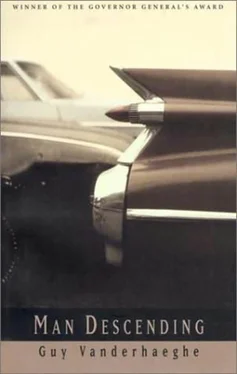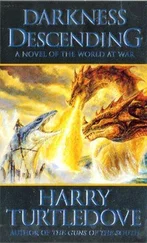“A coulee. He staggered down one slope, branches whipping his face, ploughed through a spring drift spraying the snow with specks of blood, scrabbled up the opposite bank, fingers tearing at the earth.”
Easy does it! Make Cameron Crescent, swing back on 14th Street and coast home.
“Sam could see the cold grey river flecked with ice floes as it snaked along. But the cries of the braves behind him were more distinct and had a triumphant note. One final effort. He began to sprint. A lance whistled past his head. He began to zigzag, darting and twisting to elude his pursuers.”
A car horn blasts sharply behind me and a guy in a grey Buick forces me up on the sidewalk. I hadn’t realized it, but in sympathy with Sam I had been weaving from side to side down the road, dodging Shoshone missiles.
I press on for home, a public spectacle. A couple of kids even go so far as to follow me on their bicycles, giggling and chanting, “Go man, go!” like onlookers urging on a ledge jumper. Maybe it is their intent to rifle my pockets for change when I collapse. But I disappoint them. In fact, at the very moment Sam is clawing his way out of the river shivering, retching and coughing, miles upstream and safe from his howling captors, I am fitting my key in my lock; coughing and retching. I have gone a considerable way my first time out. Perhaps as far as a mile.
I showed up at the River Run. But only to watch Victoria run. She did a lovely job, and I was proud of her although I didn’t tell her so. There was a man waiting for her at the finish with a thermos and a sponge.
I am not trying to fool myself or anyone else when I say that I could have completed the run if I had chosen to enter. By September 14 I was running six miles a day and had dropped seventeen pounds through hard work and fervent fasting. I am quite sincere and honest in saying that I could have – no, would have – finished it if I had ever toed the starting-line. It was that knowledge which gave me the strength to refrain from making a point that would have meant nothing.
I’ve changed in some ways. They are difficult to describe fairly and accurately. For instance, my domestic habits haven’t improved much. My dishes are seldom done punctually. I don’t barge in on Victoria or even phone her any more. But I still sometimes sit outside her apartment in my car, plotting extravagant schemes to regain her love. Even though I don’t believe in their efficacy any more.
But then again I’ve found myself a job. They can’t keep a good man down forever. I’m a salesman in the chinaware department in Eaton’s. I’d be lying if I claimed I liked my work, but I can bear it. It sure the hell beats working in a community college as I did before.
In a month and a half I’ve learned all the patterns, never been late for work, or obviously insulted a customer. Mrs. McCuish, my supervisor, is quite taken with the way I handle the old biddies. I have discovered a latent and surprising talent for the jollification and pacification of the blue-haired hags who stalk our aisles searching out that special piece for that “set” which has been growing like a cancer in their china cabinets since their marriages forty-five years ago. As Kierkegaard suggested, I find myself constantly amazed by my capacity to absorb abuse.
Speaking of Kierkegaard, he is slowly supplanting Sam Waters as my guide through life’s pitfalls. I’ve discovered that his approach is much more relevant to life in a department store than Sam’s. Sam is dying a slow death as I continue to transfer his story to paper. He has lost some of the importance he had when he resided principally in my imagination.
No, it’s Soren whom I contemplate as I fondle a piece of Doulton and make ecstatic faces across the counter at some dame who is starting a daughter-in-law off as a collector. Continuing the family tradition.
It is Soren I think of when I ask myself why I gave up Victoria. As he forsook Regine, did I forsake Victoria? No. I merely understood that I would only embitter her by surprising her at this late date. She needed to be done with me. And my completing the River Run would only anger her by confusing the picture of me that she had built up over our years together.
That’s not to say that I intend to leave it at that. I am going to show her I can finish something. The something is my Western, my story of Sam and his tribulations. Victoria will get a xerox copy of the manuscript in the mail. If she shows it to her friends or even Benny I won’t care. They’ll laugh, of course, and perhaps even doubt my sanity, or ponder the pass I’ve come to – selling plates and writing dusters.
I’ve already chosen an epigraph to my book, from Kierkegaard’s Journals . It’s my apology to Victoria and my admission that she was right all along. A kind of absolution that may surprise her, and, I hope, touch her. You see, she always expected more of me.
Soren wrote: “What ability there is in an individual may be measured by the yardstick of how far there is between his understanding and his will . What a person can understand he must also be able to force himself to will . Between understanding and willing is where excuses and evasions have their being.”
BY LEO MCKAY JR.
A very good book is a mystery and should remain a mystery no matter how many times we read it. This mysteriousness is part of the ineffability of all art and what makes it possible to re-approach freshly a familiar painting or a piece of music. That we never fully solve the mystery of a work of art enables that work to yield new insights and perspectives even after multiple revisits.
I’ve read Man Descending many times, and each time I’ve noticed some new detail, some previously overlooked gem of description. The full impact of the following sentence, for example, taken from “The Watcher,” escaped me until the most recent reading: “So I luxuriated in this steamy equatorial climate, tended by a doting mother as if I were a rare tropical orchid.” Aside from its succinct beauty in describing the character’s sickly childhood, the mix of hard and soft consonants makes the sentence itself patter and squish with moisture.
The tautly controlled poetry of the prose stands out to me now as never before. Notice the rhythm of the following paragraph, taken from later in the same story:
A thunderstorm was brewing. The sky was a stew of dark, swollen cloud and a strange apple-green light. The temperature stood in the mid-nineties, not a breath of breeze stirred, my skin crawled and my head pounded above my eyes and through the bridge of my nose. There wasn’t a thing to do except sit on the bottom step of the porch, keep from picking up a sliver in your ass, and scratch the dirt with a stick. My grandmother had put her hat on and driven into town on some unexplained business. Thompson and my aunt were upstairs in their bedroom, sunk in a stuporous, sweaty afternoon’s sleep.
There are many such paragraphs in this book, short sections that could stand on their own as poems, so electrifying are the images, so powerful the language.
Guy Vanderhaeghe notices startling details and renders them on the page so that they in turn startle the reader. “Poplar bluffs in the distance shook in the watery heat haze with a crazy light, crows whirled lazily in the sky like flakes of black ash rising from a fire” (“Reunion”).
These stories reveal Vanderhaeghe’s remarkable social eye. He takes note of how people interact, how they treat each other, how they view each other. In the following sentence, the protagonist of “The Expatriates’ Party” is visiting England and commenting on how he regards his hosts. “He was sorry to see the English look like the landlords of boarding-houses, possessors of a testy dignity, forced by straitened circumstances into a touchy hospitality.”
Читать дальше












